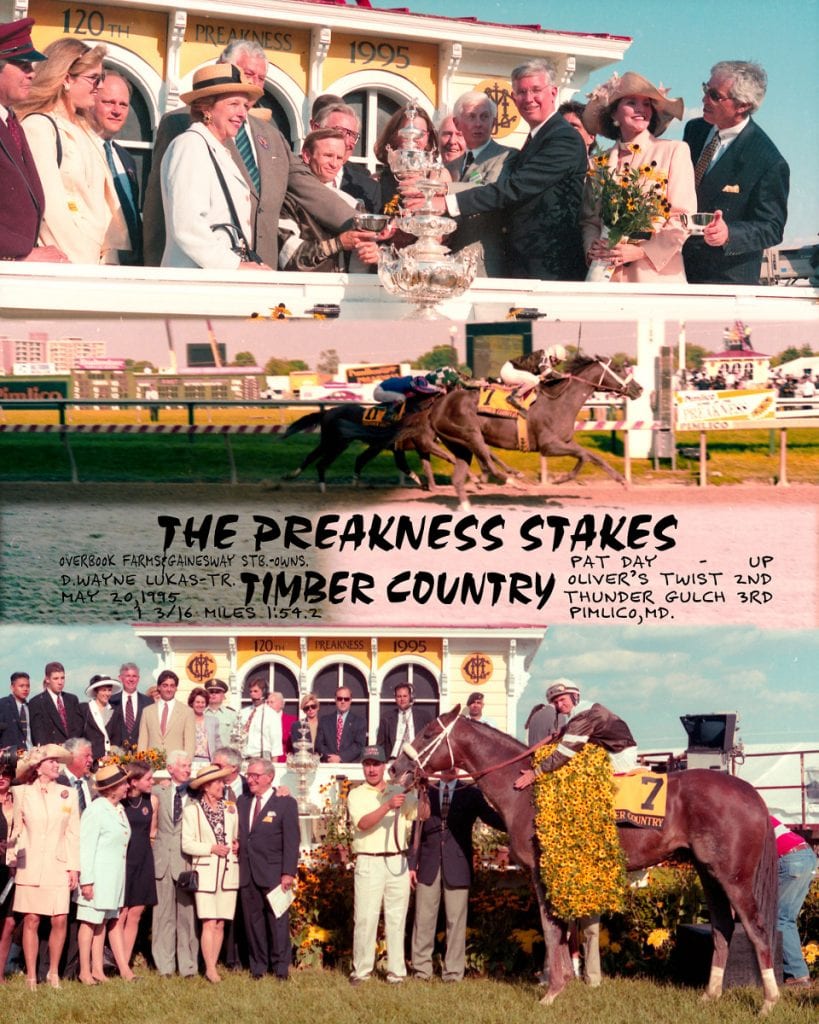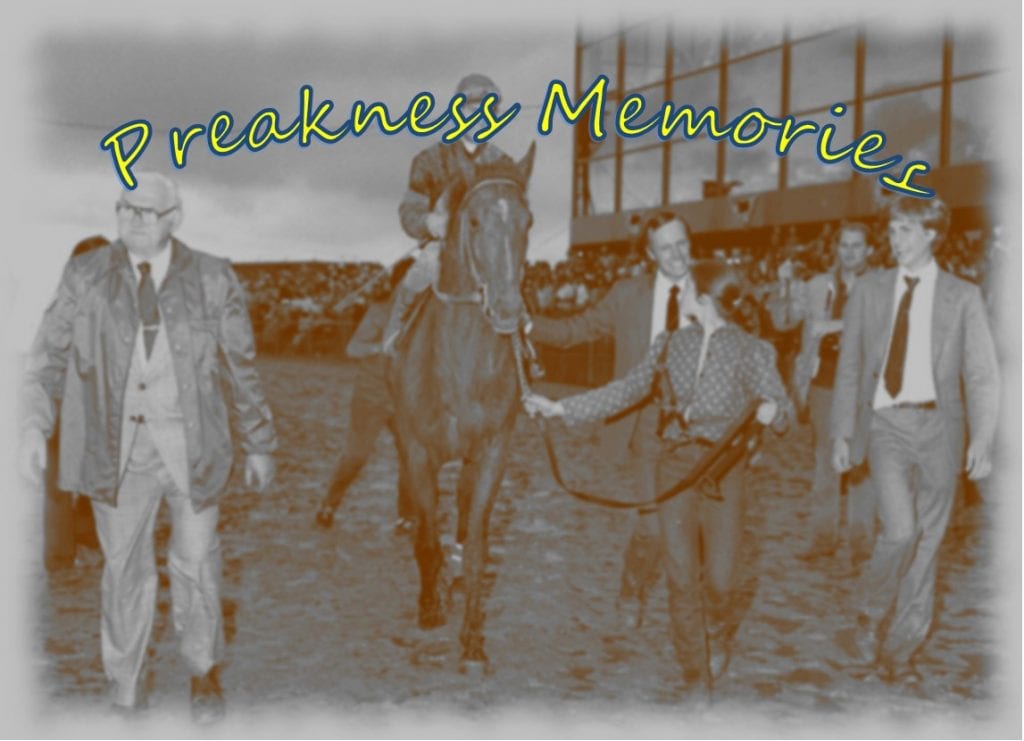PREAKNESS MEMORIES: TIMBER COUNTRY RALLIES

Timber Country’s time on the racetrack was brief, less than one year. But he made those months count, winning several of America’s most important races while racking up more than $1.5 million in earnings.
Born in Kentucky on April 12, 1992 and bred by Lowquest Ltd., the chestnut colt was sired by Woodman, and was out of the Pretense mare Fall Aspen. A half-brother to several successful runners, the colt was sold as a yearling to trainer D. Wayne Lukas, finding his way eventually to a partnership of Overbrook Farm, Gainesway Thoroughbreds, and Robert and Beverly Lewis. The final bid that the colt commanded in the sale was a lofty $500,000.
Those who had faith in the colt early on would go on to be proven right, as Timber Country became the first horse in history to capture both the Breeders’ Cup Juvenile and the Preakness Stakes.
The copper colt, trained by D. Wayne Lukas, broke his maiden at third asking in a maiden special weight race at Del Mar Racecourse. From there, Timber Country dove immediately into deeper water, taking on stakes company in his next start. He aced the test by claiming victory in the Grade 3 Balboa Stakes at Del Mar.
Timber Country entered the Grade 2 Del Mar Futurity next, but experienced a slight hiccup, finishing third behind On Target and Supremo.
Preakness Memories

No matter. The young colt returned to take down the Champagne Stakes (G1) and Breeders’ Cup Juvenile (G1) in his final two starts as a two-year-old. In the process, he defeated both the rivals who’d beaten him where the turf meets the surf.
Timber Country earned laurels as the Champion Two-Year-Old Colt of 1994. There were high hopes surrounding the freshly minted champion as he entered the 1995 racing season, but when the colt made his first start as a three-year-old in the San Rafael Stakes (G2) at Santa Anita Park, it became clear that he was off to a less auspicious start than his connections would have hoped.
Timber Country finished a surprising and disappointing third in his first start as a three-year-old – and that kicked off a four-race losing streak.
The colt showed slight improvement in his next start, turning in a runner-up effort in the Grade 2 San Felipe Stakes. However, that spark still was not there, and in the Santa Anita Derby (G1), which was his final prep before the prestigious Kentucky Derby, he could do no better than fourth.
- Stubbornness and support paying off for Tais Lyapustina
 After struggling, jockey Tais Lyapustina has begun to get some opportunities. She credits her supportive network – and her own stubbornness.
After struggling, jockey Tais Lyapustina has begun to get some opportunities. She credits her supportive network – and her own stubbornness.
By the time the first Saturday in May arrived, Timber Country was still lacking the unstoppable form that he once possessed. To make matters worse, Timber Country drew post 17 in a field of 19 for the “Run for the Roses,” stacking the odds even more against him.
A dedicated closer, Timber Country started his quest for the roses toward the back of the pack as the filly Serena’s Song, the 3.40-1 favorite, set blazing early fractions – 45.89 seconds for the half, 1:10.33 for six furlongs.
Timber Country was still in tenth place by the time the field reached the quarter-pole. After saving ground around the turn, Timber Country and jockey Pat Day swung wide in search of running room before picking his way through traffic while edging back towards the inside.
Timber Country managed to rally stoutly despite the traffic, taking an admirable third place showing behind Thunder Gulch and Tejano Run.
Although defeated in the Kentucky Derby, Timber Country displayed the old resilience and strength in the stretch that had carried him to the winner’s circle four times the year before. The stage was set for Timber Country and Thunder Gulch to square off once again in the Preakness Stakes.
Timber Country had spent the past six months of his life without a win, but his losing streak did little to shake the steadfast faith that Lukas had in the colt. And after his strong finish in the Derby two weeks earlier, the public’s faith in the colt was becoming restored as well, and Timber Country went off as the 9/5 favorite for the Preakness. Thunder Gulch, the Derby winner, was, at 3.80-1 the third choice in the field of 11.
The starting gates opened in the 120th Preakness Stakes, and the three-year-olds took off before a rowdy crowd of 87,707 at Old Hilltop. Timber Country took up a spot in mid-pack, allowing the competition to charge to the front. He remained there for much of the race, but when it was all said and done, the colt would be far from left behind.
Rounding the far turn, Pat Day gave Timber Country the cue to get rolling. The colt responded without hesitation, taking off with long strides while outside his rivals. Digging in and extending his stride, Timber Country blasted past five horses in a blur as he rolled around the turn and entered the stretch. With the lead now his and the wire in his sights, Day and Timber Country made a dash for the wire and never looked back.
Oliver’s Twist, a 25-1 longshot bred in Maryland and trained by Billy Boniface, who a dozen years earlier had won the Middle Jewel with Deputed Testamony, squeezed between horses to earn second, a neck in front of Thunder Gulch in third.
Timber Country soared over the wire to stop the clock in 1:54 2/5 and claim the cape of Black-eyed Susans.
- Stubbornness and support paying off for Tais Lyapustina
 After struggling, jockey Tais Lyapustina has begun to get some opportunities. She credits her supportive network – and her own stubbornness.
After struggling, jockey Tais Lyapustina has begun to get some opportunities. She credits her supportive network – and her own stubbornness.
Gary Stevens, the jockey who piloted Thunder Gulch, admitted that he and his steed had been defeated fair and square in the wake of the Preakness Stakes. “I couldn’t keep up with the big red train today,” he explained.
With Timber Country’s win in the Preakness Stakes also came history. The moment the colt crossed the wire Lukas joined Lucien Laurin as only the second trainer in over a century to win four consecutive Triple Crown races. Laurin’s streak came when Riva Ridge captured the Belmont Stakes in 1972, and Secretariat claimed all three Triple Crown races the following year. Lukas’s streak began in 1994 when his charge, Tabasco Cat, won the Preakness and Belmont Stakes. Thanks to Thunder Gulch and Timber Country taking the 1995 Derby and Preakness respectively, the trainer had made it a rare sweep of four classics in a row.
Unfortunately, the Preakness Stakes would be the last racing hurrah for Timber Country. The colt sat out the Belmont Stakes out with a poorly timed fever, and then ended up retiring from the track altogether later that summer. It was discovered that the colt had a slight tear in the ligament above his left ankle. While it was an injury that might have mended with time, it was one that required a lengthy recovery period. After all that the colt had already accomplished, and the tedious recovery ahead, Timber Country’s connections agreed that Timber Country would walk away from the races and move toward a new career at stud.
“He’s pretty much enhanced his career already,” Lukas said. “We’re not going to try to bring him back.”
Timber Country got around quite literally as a stud, shuttling from Japan, to Australia, and even Dubai. Having great success in Japan, the stallion lived out most of his life there until he passed away at the age of 24. The stallion passed peacefully at Lex Stud in Hokkaido Japan, with heart failure the culprit.
The loss of Timber Country was felt heavily at Lex Stud with Akira Maeda, the managing director, stating that their plans were to “erect a monument to his (Timber Country) memory in Cherry Blossoms Park near Lex Stud.”
LATEST TRIPLE CROWN NEWS














